|
| |
THIRD ANNUAL IAAC LITERARY FESTIVAL
NYU KIMMEL CENTER, 60 WASHINGTON SQUARE SOUTH, NYC
|
| OCTOBER 7-9, 2016 |
| |
| Saturday Oct 8, 2016 5:00 - 6:00 pm |
|
| |
Session 5B
Politics and Turmoil |
 |
| |
|
|
| |
|
|
|
| |
Salil Tripathi, Barkha Dutt, Kanchan Chandra in conversation with Chidanand Rajghatta
Political journalists and authors recount lives inescapably dependent on the politics and turbulence of the Indian sub-continent. |
| |
| Salil Tripathi |
| |
 Salil Tripathi is the author of Offence: The Hindu Case (Seagull, 2009), The Colonel Who Would Not Repent: The Bangladesh War and its Unquiet Legacy (Aleph, 2014 and Yale University Press, 2016), and Detours: Songs of the Open Road (Tranquebar, 2015). He is currently working on a book about Gujaratis. He was born in India and has been a foreign correspondent in Singapore and Hong Kong and now lives in London. He is contributing editor at Mint and Caravan in India. Last year, he was elected as the Chair of the Writers in Prison Committee of PEN International. Salil Tripathi is the author of Offence: The Hindu Case (Seagull, 2009), The Colonel Who Would Not Repent: The Bangladesh War and its Unquiet Legacy (Aleph, 2014 and Yale University Press, 2016), and Detours: Songs of the Open Road (Tranquebar, 2015). He is currently working on a book about Gujaratis. He was born in India and has been a foreign correspondent in Singapore and Hong Kong and now lives in London. He is contributing editor at Mint and Caravan in India. Last year, he was elected as the Chair of the Writers in Prison Committee of PEN International.
Salil is an award-winning journalist and writer. His awards include the Citibank Pan Asia Economic Journalism Award in 1994, Bastiat Prize (third prize) in 2011, and Red Ink Award for Human Rights Journalism in 2015. His articles have also appeared in major international newspapers and magazines, including the Wall Street Journal, Washington Post, International Herald Tribune, New Statesman, Guardian, Independent, Far Eastern Economic Review, and many others. In a parallel life, he is senior adviser, global issues, at the Institute for Human Rights and Business.
|
| |
The Colonel Who Would Not Repent
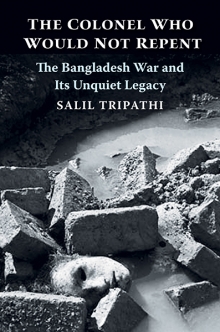 Bangladesh was once East Pakistan, the Muslim nation carved out of the Indian Subcontinent when it gained independence from Britain in 1947. As religion alone could not keep East Pakistan and West Pakistan together, Bengali-speaking East Pakistan fought for and achieved liberation in 1971. Coups and assassinations followed, and two decades later it completed its long, tumultuous transition to parliamentary government. Its history is complex and tragic-one of war, natural disaster, starvation, corruption, and political instability.
Bangladesh was once East Pakistan, the Muslim nation carved out of the Indian Subcontinent when it gained independence from Britain in 1947. As religion alone could not keep East Pakistan and West Pakistan together, Bengali-speaking East Pakistan fought for and achieved liberation in 1971. Coups and assassinations followed, and two decades later it completed its long, tumultuous transition to parliamentary government. Its history is complex and tragic-one of war, natural disaster, starvation, corruption, and political instability.
First published in India by the Aleph Book Company, Salil Tripathi’s lyrical, beautifully wrought tale of the difficult birth and conflict-ridden politics of this haunted land has received international critical acclaim, and his reporting has been honored with a Mumbai Press Club Red Ink Award for Excellence in Journalism. The Colonel Who Would Not Repent is an insightful study of a nation struggling to survive and define itself. |
|
| Barkha Dutt |
 Barkha Dutt, one of India’s most prominent journalists and television anchors, became a household name with her reporting from the front lines during the Kargil conflict between India and Pakistan in 1999. In addition to her war reporting (from countries as varied as Pakistan, Afghanistan, Iraq, Egypt and Libya), in India she has reported from the field on virtually every important national story - politics, insurgencies, social upheavals, floods and famine. She has won more than forty national and international honours for her work. Barkha Dutt, one of India’s most prominent journalists and television anchors, became a household name with her reporting from the front lines during the Kargil conflict between India and Pakistan in 1999. In addition to her war reporting (from countries as varied as Pakistan, Afghanistan, Iraq, Egypt and Libya), in India she has reported from the field on virtually every important national story - politics, insurgencies, social upheavals, floods and famine. She has won more than forty national and international honours for her work.
Barkha Dutt is Consulting Editor with NDTV, India's premier news network. She is one of India's best-known journalists and the youngest to receive ‘Padma Shri’, one of India’s highest State honours. In her twenty-year career, she has covered several conflict zones, including Kashmir, Afghanistan, Pakistan, Iraq, Egypt and Libya. Barkha has interviewed a range of personalities around the world and at home including Hillary Clinton, Bill Clinton, Nawaz Sharif, Bill and Melinda Gates, Tony Blair, Aung San Suu Kyi, Hamid Karzai, Malala Yousafzai, Kailash Satyarthi, His Holiness The Dalai Lama, Indra Nooyi and Salman Rushdie. She hosts India’s longest-running talk show ‘We The People’ and a daily primetime show ‘The Buck Stops Here’. Last year, her coverage of the Kashmir floods became the first Indian series to be nominated for the International Emmy Awards in the News category. Barkha is active on Twitter (@bdutt) where she is followed by over 4 million people. She has now turned entrepreneur with her own multimedia content company.
In a career spanning two decades, she has won over fifty national and international awards for journalism including the Global Leader for Tomorrow award by the World Economic Forum, the Commonwealth Broadcasters' award for 'Journalist of the Year' and the Asian Television Awards for ‘Best News Presenter or Anchor’ (2015), ‘Best Current Affairs Presenter’ (2012) and ‘Best Talk Show’ (2006, 2010 & 2014). Last year, her daily primetime show The Buck Stops Here became the first Indian TV show to be nominated for the International Emmy Awards in the News category. In 2012, she won ‘International TV Personality of the Year’ at the Association for International Broadcasting awards in London. In 2014, she also won News Television Award for Best TV News Anchor (English) for a second year in a row. She has also bagged Indian Television Academy award for Best Talk Show for five consecutive years. |
|
| |
| |
| |
| Unquiet Land |
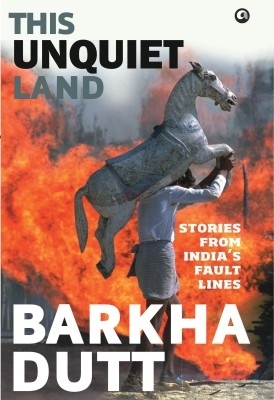 One of the most remarkable books ever published about contemporary India, arguably the most complex society on earth, This Unquiet Land tells the truth about the country's secrets and lies, its torments and triumphs and its heroes and villains. This is the first book by Barkha Dutt, India's best known journalist. India's fault lines run wide and deep. Some of them go back centuries, others are of comparatively recent origin. The myriad villains these fault lines have spawned include rapists, murderers, terrorists, prophets of religious hatred, corrupt politicians, upholders of abhorrent caste traditions, opponents of free speech and dissent, apologists for regressive cultural practices and external adversaries who try to destabilize our borders. One of the most remarkable books ever published about contemporary India, arguably the most complex society on earth, This Unquiet Land tells the truth about the country's secrets and lies, its torments and triumphs and its heroes and villains. This is the first book by Barkha Dutt, India's best known journalist. India's fault lines run wide and deep. Some of them go back centuries, others are of comparatively recent origin. The myriad villains these fault lines have spawned include rapists, murderers, terrorists, prophets of religious hatred, corrupt politicians, upholders of abhorrent caste traditions, opponents of free speech and dissent, apologists for regressive cultural practices and external adversaries who try to destabilize our borders.
Some of them go back centuries, others are of comparatively recent origin. The myriad villains these fault lines have spawned include rapists, murderers, terrorists, prophets of religious hatred, corrupt politicians, upholders of abhorrent caste traditions, opponents of free speech and dissent, apologists for regressive cultural practices, and external adversaries who try to destabilize our borders. All of them are responsible for impeding the country’s progress, destroying the lives of numberless innocents, usually the poorest and most vulnerable of our people, and besmirching the democratic, plural, free and secular nature of our society.
Set against these enemies of our nation’s promise are the heroic ones - the poor, illiterate woman who was gang-raped but helped change the nation’s attitude towards women through her determined fight for justice; the young soldier whose courage and sacrifice in the high Himalayas was an inspiration to his comrades fighting the Kargil War; the wife whose husband was beheaded by Maoist terrorists, yet sought not revenge but succour for the poor and underprivileged; and the son of the village blacksmith who was lynched by a mob of religious fundamentalists appealing for an end to discord and sectarian violence.
These stories, and dozens of others like them, map our country’s fault lines. In this book, Barkha Dutt recounts the ones that have left an indelible mark on her. Taken together, they provide a vivid, devastating and unforgettable portrait of our unquiet land. |
|
| Kanchan Chandra |
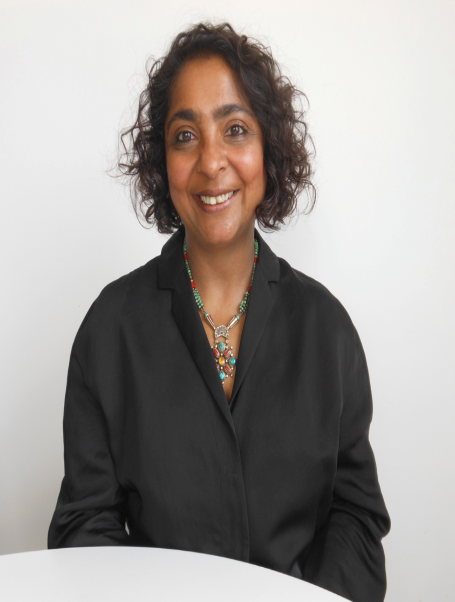 Kanchan Chandra (PhD 2000, Harvard University, Massachusetts), is Professor of Politics at New York University. She is lead author of Constructivist Theories of Ethnic Politics (2012), author of Why Ethnic Parties Succeed: Patronage and Ethnic Headcounts in India (2004), and has written articles for several leading journals. Her work has been supported by fellowships and grants from the Princeton Program on Democracy and Development, the Carnegie and Guggenheim Foundations, the National Science Foundation, the United States Institute of Peace, the Center for Advanced Studies in the Behavioural Sciences at Stanford University, Connecticut, the Russell Sage Foundation, and the Harvard Academy for International and Area Studies.
Kanchan Chandra (PhD 2000, Harvard University, Massachusetts), is Professor of Politics at New York University. She is lead author of Constructivist Theories of Ethnic Politics (2012), author of Why Ethnic Parties Succeed: Patronage and Ethnic Headcounts in India (2004), and has written articles for several leading journals. Her work has been supported by fellowships and grants from the Princeton Program on Democracy and Development, the Carnegie and Guggenheim Foundations, the National Science Foundation, the United States Institute of Peace, the Center for Advanced Studies in the Behavioural Sciences at Stanford University, Connecticut, the Russell Sage Foundation, and the Harvard Academy for International and Area Studies. |
|
|
|
| |
Democratic Dynasties - State, Party & Family in Contemporary Indian Politics |
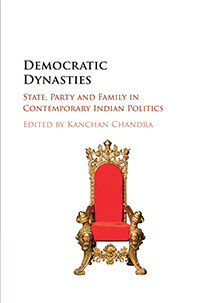 This is the first book to theorize about the relationship between dynasty and democracy. It based on original data on over 1200 M.P.s from India’s twenty-first century parliaments (2004, 2009 and 2014). This is the first book to theorize about the relationship between dynasty and democracy. It based on original data on over 1200 M.P.s from India’s twenty-first century parliaments (2004, 2009 and 2014).
These are the most comprehensive data currently available on individual MPs in contemporary Indian parliaments. The book places dynasticism in India in a global comparative context, showing that it is not unique. 24% of Indian MPs in the twenty-first century have a dynastic background, placing India squarely in the middle of all democracies for which we have data on dynasticism in the legislature.
It argues that dynastic politics in India is produced and maintained by political parties - in particular the process by which tickets are allocated within parties - and not by an Indian cultural preference for dynastic politics, or by voters who prefer dynastic politics. It proposes that dynastic politics in India has a mixed effect on democracy: it creates a birth-based form of exclusion, and amplifies dominance, especially among upper castes. But at the same time, it increases the representation of subaltern groups beyond the level at which that they may have been represented otherwise. |
|
| Chidanand Rajghatta |
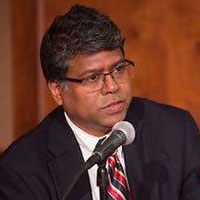 Chidanand Rajghatta has been a foreign correspondent based in the United States since 1994, which makes him somewhat of a relic among a fast-dwindling species of an endangered genre. Chidanand Rajghatta has been a foreign correspondent based in the United States since 1994, which makes him somewhat of a relic among a fast-dwindling species of an endangered genre.
Chidu Rajghatta initially came to Washington DC in 1994 as a U.S Correspondent of the Indian Express, of which he was the Resident Editor of the flagship edition in Mumbai. In 2001, after six years of reporting for the Indian Express from the United States, he accepted the position of the Foreign Editor of The Times of India, with whom he had been associated since 1990, intending to go return to India soon after wrapping up the Bush v Gore Presidential election in 2000. In fact, he was all packed and ready to move in November 2000, but as we all know, that was an election that didn’t end on schedule. Or at least the verdict wasn’t settled on schedule.
Asked to stay on in Washington DC, he still intended to return to India by the year-end, when 9/11 happened. Three more years passed by in a flash, and before he knew it, he had a dog, a cat, a car, a mortgaged home, a girlfriend and other accouterments of permanency. Worse, he was rooting for the local football team, and reading the sports and metro pages of the Washington Post, and was subscribed to the Takoma Voice, the sub-local paper from his neck of the woods.
In effect, Chidu Rajghatta has been a Washington DC-based Foreign Correspondent for 22 years, covering some six Presidential terms (and elections), three Presidents, and an assortment of historic events and stories in the U.S and across the globe. Strangely, this has included covering world cup cricket in England and South Africa, wildlife and conservation in South America, and immigration and diaspora in Europe and North America. Between all this, he has also remained in touch with politics and turmoil in India, once miraculously reporting on Sonia Gandhi v Sushma Swaraj byelection in Bellary, India, while he was still a U.S Correspondent, an event that took place close to his roots in Karnataka.
Speaking of roots, and as evidence of his close connection to India, he likes to boast – when the USDA is not listening – that his foodgrains come from his farmstead at back home. |
| |
| |
|
|

